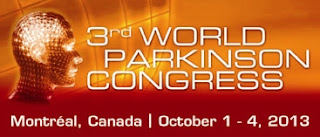Muscle-tensing drama, breath-stopping excitement, heart-pounding action, adrenaline-rushing exhilaration, senses fully alive and abandoning comfort for risk; that is adventure. Whether we watch Mission Impossible, read Swiss Family Robinson, or bungee jump off of a suspension bridge, there seems to be an irresistible drive to seek out the challenging, experience the unexplored, pursue the fear-producing, sacrifice security or even double in the dangerous. Odd behavior, isn't it? But doesn't it make you feel more alive? We find out who we really are in the grip of adventure.
Why am I doing this? Why does anyone seek out adventure? Do I have something to prove? Maybe, just maybe, I need to prove that a person with Parkinson's disease can still live the adventure. I need to prove that it is possible to be Positively Parkinson's!
"It is in the compelling zest of high adventure and of victory, and in creative action, that man finds his supreme joys", said Antoine de Saint-Exupery (who was famous while alive as an aviator, dying on a reconnaissance flight for the Free French Air Force in 1944, only posthumously becoming known as the author of "The Little Prince").
Ever since I was a young boy I have been an avid adventure-seeker. Skydiving, scuba diving, motorcycle riding, wilderness hiking, driving across the Atlas Mountains in winter in order to reach the Sahara desert sailing flat out in the stormy. Eating snake in a restaurant in old Canton, China, my life has been a series of adventures. But the biggest one yet will start on May 1, 2012.
Going around the world may not be a choice of many. Doing it with 16 stops in 75 days (who needs 80?) is rare. Not doing it to see the sights is virtually unheard of. But I, and my friend, Carson, are doing exactly that.
Leaving May 1, 2012, from Vancouver, we will be flying in sequence to:
Lima, Peru
Cuzco, Peru (gateway to Manchu Picchu)
Santiago, Chile
Buenos Aries, Argentina
Johannesburg, South Africa
Kigali, Rwanda
Nairobi, Kenya (side trip to Maasai Mara)
Kisumu, Kenya (on the shores of Lake Victoria)
Addis Ababa, Ethiopia
Kuwait City, Kuwait
Mumbai, India
Chiang Mai, Thailand
Singapore
Sydney, Australia
Auckland, New Zealand
Fiji
We will be returning to Vancouver on July 1, 2012; 75 days and approximately 40,000 km (25,000 miles) later. Now that's a Grande Adventure Of a Lifetime.
At each stop, it is our plan to visit with leaders of charities, nonprofit organizations and ministries doing good work effectively in each country. As well, I will be seeking out members of the global Parkinson's disease community, be they practitioners or patients, researchers or association leaders. I want to learn from them, share with them and, along with Petey, invite them to my country, Canada, for the World Parkinson Congress in Montréal, 2013. Maybe you know someone I should meet along the way. If so, let me know. My e-mail address is bobkuhn1@gmail.com.
I hope you will come along, virtually speaking that is, as I blog about our experiences, the people we meet, and what we learn. It won't be a travelogue or a monologue or catalogue of tourist sites. It will be a dialogue with cultures I try to understand, and citizens I have never met, from countries I have never seen.


































